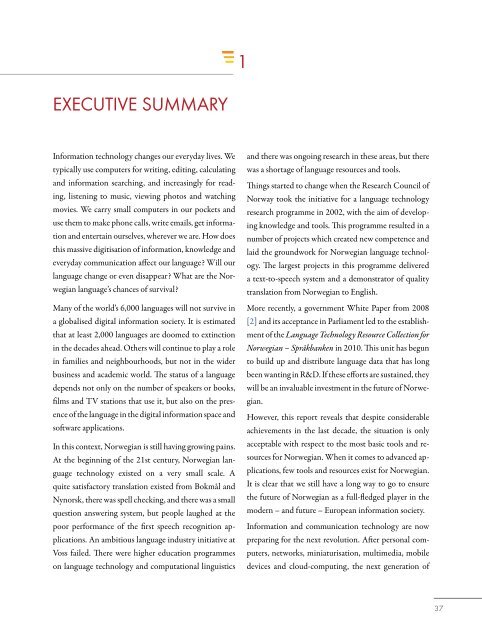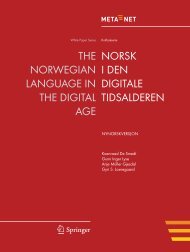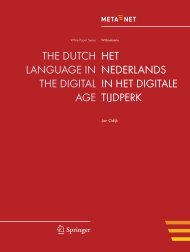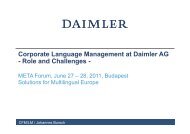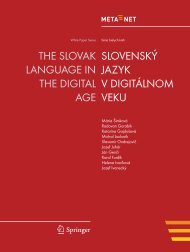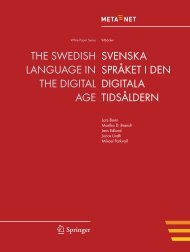Norsk i den digitale tidsalderen - Meta-Net
Norsk i den digitale tidsalderen - Meta-Net
Norsk i den digitale tidsalderen - Meta-Net
You also want an ePaper? Increase the reach of your titles
YUMPU automatically turns print PDFs into web optimized ePapers that Google loves.
EXECUTIVE SUMMARY<br />
Information technology changes our everyday lives. We<br />
typically use computers for writing, editing, calculating<br />
and information searching, and increasingly for read-<br />
ing, listening to music, viewing photos and watching<br />
movies. We carry small computers in our pockets and<br />
use them to make phone calls, write emails, get informa-<br />
tion and entertain ourselves, wherever we are. How does<br />
this massive digitisation of information, knowledge and<br />
everyday communication affect our language? Will our<br />
language change or even disappear? What are the Nor-<br />
wegian language’s chances of survival?<br />
Many of the world’s 6,000 languages will not survive in<br />
a globalised digital information society. It is estimated<br />
that at least 2,000 languages are doomed to extinction<br />
in the decades ahead. Others will continue to play a role<br />
in families and neighbourhoods, but not in the wider<br />
business and academic world. e status of a language<br />
depends not only on the number of speakers or books,<br />
films and TV stations that use it, but also on the pres-<br />
ence of the language in the digital information space and<br />
soware applications.<br />
In this context, Norwegian is still having growing pains.<br />
At the beginning of the 21st century, Norwegian lan-<br />
guage technology existed on a very small scale. A<br />
quite satisfactory translation existed from Bokmål and<br />
Nynorsk, there was spell checking, and there was a small<br />
question answering system, but people laughed at the<br />
poor performance of the first speech recognition ap-<br />
plications. An ambitious language industry initiative at<br />
Voss failed. ere were higher education programmes<br />
on language technology and computational linguistics<br />
1<br />
and there was ongoing research in these areas, but there<br />
was a shortage of language resources and tools.<br />
ings started to change when the Research Council of<br />
Norway took the initiative for a language technology<br />
research programme in 2002, with the aim of develop-<br />
ing knowledge and tools. is programme resulted in a<br />
number of projects which created new competence and<br />
laid the groundwork for Norwegian language technol-<br />
ogy. e largest projects in this programme delivered<br />
a text-to-speech system and a demonstrator of quality<br />
translation from Norwegian to English.<br />
More recently, a government White Paper from 2008<br />
[2] and its acceptance in Parliament led to the establish-<br />
ment of the Language Technology Resource Collection for<br />
Norwegian – Språkbanken in 2010. is unit has begun<br />
to build up and distribute language data that has long<br />
been wanting in R&D. If these efforts are sustained, they<br />
will be an invaluable investment in the future of Norwe-<br />
gian.<br />
However, this report reveals that despite considerable<br />
achievements in the last decade, the situation is only<br />
acceptable with respect to the most basic tools and re-<br />
sources for Norwegian. When it comes to advanced ap-<br />
plications, few tools and resources exist for Norwegian.<br />
It is clear that we still have a long way to go to ensure<br />
the future of Norwegian as a full-fledged player in the<br />
modern – and future – European information society.<br />
Information and communication technology are now<br />
preparing for the next revolution. Aer personal com-<br />
puters, networks, miniaturisation, multimedia, mobile<br />
devices and cloud-computing, the next generation of<br />
37


